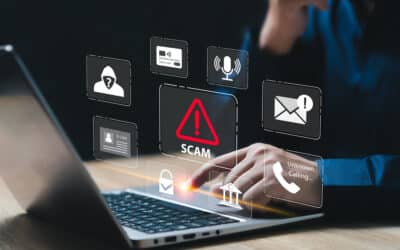Some people seeking student debt forgiveness may not understand the process or know which sources to trust to see if they qualify. Unfortunately, loan scammers take advantage of those individuals. In doing so, they create fake student loan forgiveness applications to try to collect your personal details. While researching student loan relief programs, here’s what you need to know so you don’t fall victim to a student loan forgiveness scam.
Is Student Loan Forgiveness Real?
Yes, national debt relief is legit. In August 2022, the U.S. Government announced the Student Loan Debt Relief Plan, which provides student loan debt forgiveness to specific U.S. income earners.
However, in November 2022, the courts blocked the Student Loan Debt Relief Plan. So, the U.S. Department of Education is not currently accepting student loan relief applications. If you have already submitted your application, it will be held. New applicants may only apply for student loan forgiveness if the court order is overturned.
Ways to Avoid Student Loan Forgiveness Scams
While there are plenty of legitimate student loan debt relief programs, there are also many loan forgiveness scams. Don’t ignore the warning signs of student loan scams, including any communication that:
- Pressures you or requires an urgent response
- Makes unrealistic promises
- Wants upfront payments
- Asks for sensitive information
Don’t Pay Fees — Forgiveness Is Free!
The U.S. Government will not charge processing fees in any type of currency, whether that’s traditional or crypto. So, if someone tells you they can get your loan relief approved for a fee, do not give them any personal information or payments.
Guard Your Sensitive Information
Be wary of emails, text messages, and websites that ask for personal information. This sensitive data could be your name, social security number, date of birth, current or previous address, FSA ID password, routing number, and more. Remember that your federal student loan debt relief application doesn’t require initial payment, so there would be no reason to collect your banking or credit card information.
Always Verify Your Sources
Scammers will often use electronic communications like phishing emails, unsolicited messages, or calls about student loan forgiveness. To avoid loan forgiveness scams, ignore those messages, stop scammers from calling, and never open or download attachments from unknown senders.
Updates will only come from these trusted email addresses:
You can often spot malicious sites and online scams through misspelled words, grammatical errors, and the misuse of the Department of Education seal. To confirm you’re speaking with a U.S. Department of Education partner, review the list of contracted federal student loan servicers.
Use Caution When Clicking Links or Ads
In addition to emails and other digital communications, scammers are also using paid ads to engage people who are researching the program. When searching “student loan forgiveness” on Google, almost 12% of ads show potential malicious intent. Despite Google having strict rules for ads, there is still a risk of student loan scams on paid search, so only click on results from trusted websites.
What to Do If You’ve Been Scammed Online
If you’ve been scammed while researching student loan forgiveness, here are a few steps to help you get some control back:
- Report the online scam to the FBI Internet Crime Complaint Center as quickly as possible. You’ll also want to submit a complaint to the Department of Education and the Consumer Financial Protection Bureau.
- Record your activity and report the fraud website or ads to their platform.
- Contact your financial institution immediately to stop or reverse any transactions.
- Keep track of your transaction information, including prepaid cards, banking records, and forms of communication.
- Monitor your financial accounts and credit reports.
For more cybersecurity tips or information on student loan forgiveness scams, contact our experts today and we’ll help answer any questions you have about the student relief program.





